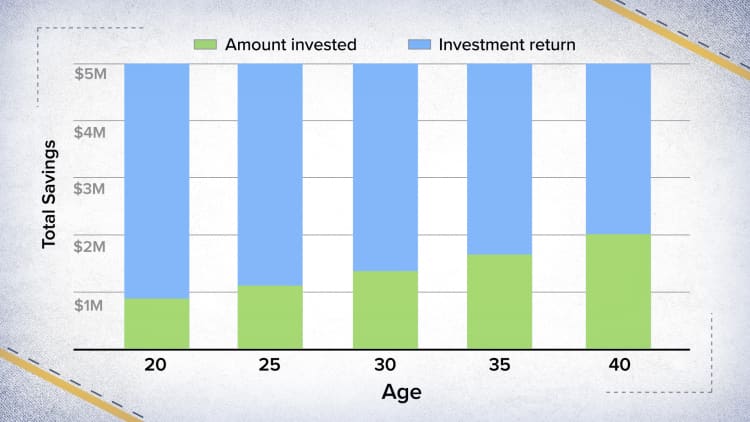Financial firms are trying to help Americans withdraw money from their retirement accounts.
How and when to start such withdrawals is one of the most persistent problems in personal finance and it's only growing more acute as hordes of baby boomers hurtle into their golden years.
Withdrawing money from 401(k) plans, individual retirement accounts, taxable brokerage accounts and other piles of savings can be a fraught process for people who've spent perhaps four decades amassing money to live off in their retirement years.
In addition to the psychological challenges of becoming a spender versus a saver, there are several risks and moving pieces that financial experts say make the process of withdrawing assets inherently more difficult than saving and investing.
Retirees must, for example, estimate how inflation may erode savings over time, how long they expect to live and how stock-market performance could affect their portfolios. They must also determine the most tax-efficient way to tap their accounts — it may make more financial sense with any particular withdrawal to use a Roth IRA instead of taxable accounts, for example.
More from Invest in You:
Money mind hacks from bloggers can boost your finances
Retirement luxury on a Social Security budget
If you don't know much about investing start here
That's in addition to more fun, but perhaps equally challenging, decisions around how to best enjoy retirement and spend one's money — for example, do I want to spend my money traveling or leave most of it to children or grandchildren?
These factors are all in service to one seemingly simple question: How will I get a paycheck in retirement?
"It's a difficult math equation," said Greg Ungerman, a senior vice president at Callan, a consulting firm.
Firms like Charles Schwab and Fidelity Investments are leveraging technology to try making the process easier for retirees. And experts say this is a primary focus for most financial institutions, which recognize the opportunity afforded by the task's complexity and demographic demand.
"There are 10,000 baby boomers retiring every day," said Tobin McDaniel, head of digital advice and innovation at Charles Schwab. "They're trying to figure out how to make their money last."

Charles Schwab, for example, plans to roll out a feature this month for its robo-advisor service that manages withdrawals for consumers across their accounts.
The service, Schwab Intelligent Income, automatically sends a check to users on a recurring basis, perhaps weekly or monthly. It considers factors such as tax efficiency and lets consumers model different levels of spending to see how they translate into better or worse odds of running out of money.
Schwab is one of the first robo-advisors, which use algorithms to automate investment decisions for consumers, to develop such an income-oriented service, said Dennis Gallant, a senior analyst at consulting firm Aite Group.
He expects other firms to be hot on Schwab's heels.
"I don't think there's any firm out there not working on an aspect of retirement income and building out tools in that regard," Gallant said. "2020 will be the year of a lot of firms pushing their initiatives."
It's a difficult math equation.Greg Ungermansenior vice president at Callan
In the first half of this year, Fidelity Investments plans to broadly roll out a free digital service for investors in 401(k)-type plans to help them model various income scenarios in retirement. The model shows how specific factors, such as life expectancy, start date of withdrawals and 401(k) investments, would translate into future income payments in retirement.
Fidelity, which administers roughly $2 trillion of assets in 401(k) and other workplace plans, debuted the service to a limited subset of its clients in the fall.
Some 401(k) firms have similar modeling capabilities, and most have "retirement income calculators" on their websites that estimate the probability of an investor's 401(k) balance lasting throughout retirement. However, unlike Schwab, they haven't automated the process by sending a check to retirees.
Managing retirement income has been the bread and butter of seasoned financial advisors for decades. Big financial advice firms like Morgan Stanley have leveraged technology providers such as LifeYield to help their advisors give recommendations around the most efficient way to draw down household assets.

But everyday Americans don't always have the financial resources to afford a traditional advisor, and advisors tend to gravitate toward wealthier clients.
Robo-advisors have generally been a lower-cost way to help manage one's finances, and can help make retirement-withdrawal services accessible to more everyday Americans, Gallant said.
Of course, there are some wrinkles to existing services, experts said. For one, it's difficult for firms to factor retirement savings held elsewhere into their calculations.
Schwab's algorithm can only automate distributions from the brokerage accounts held with its robo-advisor service, meaning consumers would be left to determine how to treat an outside 401(k) plan account, for example.






